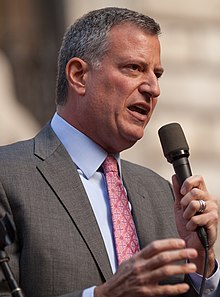Mayor of New York City
| Mayor of the City of New York | |
|---|---|

|
|
| Style | His/Her Honor |
| Residence | Gracie Mansion |
| Term length | Four years; may serve two consecutive terms |
| Inaugural holder | Thomas Willett |
| Formation | 17th century |
| Salary | $225,000 |
| Website | www.nyc.gov/mayor |
The Mayor of the City of New York is head of the executive branch of New York City's government. The mayor's office administers all city services, public property, police and fire protection, most public agencies, and enforces all city, state and federal laws within New York City.
The budget overseen by the mayor's office is the largest municipal budget in the United States at $70 billion a year. The city employs 325,000 people, spends about $21 billion to educate more than 1.1 million students (the largest public school system in the United States), levies $27 billion in taxes, and receives $14 billion from the state and federal governments.
The mayor's office is located in New York City Hall; it has jurisdiction over all five boroughs of New York City: Manhattan, Brooklyn, the Bronx, Staten Island and Queens. The mayor appoints a large number of officials, including commissioners who head city departments, and his deputy mayors. The mayor's regulations are compiled in title 43 of the New York City Rules. According to current law, the mayor is limited to two consecutive four-year terms in office. It was changed from two to three terms on October 23, 2008, when the New York City Council voted 29–22 in favor of passing the term limit extension into law. However, in 2010, a referendum reverting the limit to two terms passed overwhelmingly.
The current mayor is Democrat Bill de Blasio, who was elected on November 5, 2013.
In 1665, Governor Richard Nicolls appointed Thomas Willett as the first mayor of New York. For 156 years, the mayor was appointed and had limited power. Between 1783 and 1821 the mayor was appointed by the Council of Appointments in which the state's governor had the loudest voice. In 1821 the Common Council, which included elected members, gained the authority to choose the mayor. An amendment to the New York State Constitution in 1834 provided for the direct popular election of the mayor. Cornelius W. Lawrence, a Democrat, was elected that year.
...
Wikipedia

